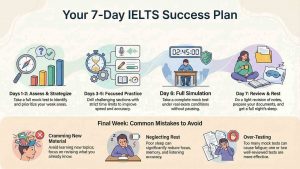IELTS Exam Tips 2026: Last-Minute Preparation

To achieve an IELTS band score of 8+ during your final week, follow a 7-day IELTS study plan that helps you identify your weaknesses and strengths through full-length mock tests. IELTS Listening, Reading, Writing and Speaking practice tests will help you develop proven strategies, such as skimming and scanning techniques for Reading; using cohesive devices for Writing Task 2 and practising with the official IELTS practice material to mimic real IELTS exams. To boost your overall score, avoid common mistakes, such as last-minute cramming. Instead, focus on your time management, review past mistakes, and ensure you are well-rested before the big day.
Preparing for the IELTS exam in the final week can be difficult, but with the right approach, you can still make meaningful progress. Even with underpreparedness, focused study sessions, and good time management, you can help strengthen your skills in Listening, Reading, Writing, and Speaking. The key is to review common question types, practice under timed conditions, and identify areas for improvement to enhance speed and accuracy.
These IELTS exam tips are designed to help you stay calm and confident in the final days before your test. Whether this is your first attempt or retake, following these last-minute IELTS exam strategies will help to stay organised and also boost your overall band score.
IELTS Last-Minute Preparation Tips: 7-Day Plan
Following these practical IELTS exam tips to make the most of your final week before IELTS exam and improve your overall IELTS preparation:
Dat 1-2: Identify Strengths & Weaknesses
- Take a full-length mock IELTS test to assess your current level of proficiency.
- Analyse your performance in all four sections: Listening, Reading, Writing, and Speaking.
- Note where you are losing marks and also list your weak areas.
- Create a daily plan that allocates more time to the more challenging sections.
Day 3-5: Focused Practice
- Practise reading passages with strict time limits for improving speed as well as accuracy.
- Listen to IELTS audio recordings to sharpen your focus and note-taking skills.
- Work on writing tasks- which focus on structure, clarity, and grammar.
- Try recording your speaking answers to evaluate pronunciation and fluency.
Day 6: Full-Length IELTS Test Simulation
- Attempt a full IELTS mock test under real exam conditions.
- Follow the exact timing and sequence of the actual exam.
- Don’t pause or redo any section- simulate the absolute pressure.
- Review your results and identify areas to refine before the test day.
Day 7: Light Revision & Rest
- Revise key notes, essay templates, and vocabulary lists.
- Avoid learning new topics that focus on building confidence.
- Prepare all documents, which are also essential for the test day.
- Sleep early and also stay calm for the exam.
Read Also: IELTS Syllabus
Section-Wise IELTS Tips for Last-Minute Revision
Each section of the IELTS exam requires a specific strategy. Below are some expert-backed IELTS exam tips and also section-wise strategies for Listening, Reading, Writing, and Speaking, which help to score better:
IELTS Listening Test Tips
Enhance your listening accuracy and concentration with these IELTS listening test tips:
- Use official IELTS audio materials for authentic practice.
- Avoid pausing or replaying – train yourself to listen in real time.
- Skimming questions before the recording starts to understand what to listen to.
- Practice note-taking and also underline important keywords during listening tasks.
- Focus on understanding accents like British, American, or Australian, for clarity.
IELTS Reading Test Tips
Boost your reading speed and accuracy using these IELTS Reading test tips:
- Practice skimming for the main idea and also scanning for specific details.
- Focus on tricky question types, such as true/false or not given.
- Improve your ability to guess word meanings from context.
- Manage your time wisely – move on if you’re stuck, and return later if possible.
- Strengthen comprehension by reading short academic articles daily.
Read Also: IELTS Practice Test
IELTS Writing Test Tips
Improve structure and also clarity in your essays with these IELTS Writing test tips:
- Memorise essay structures for both IELTS Writing Task 1 (Report/Letter) and Task 2 (Essay).
- Using more precise and concise language- avoid using overly complex vocabulary.
- Pay attention to grammar, punctuation, and spelling.
- Practice writing within 20 minutes (Task 1) and 40 minutes (Task 2).
- Use connectors to enhance coherence.
IELTS Speaking Test Tips
Developing fluency and natural communication using these IELTS Speaking test tips
- Practice answering common IELTS speaking questions daily.
- Record your responses and also evaluate pronunciation and pacing.
- Don’t memorize, but aim for spontaneous and confident speech.
- Work on natural intonation and avoid long pauses.
- Simulate test conditions with a friend or a mirror for practicing.
Read Also: IELTS Eligibility
Common Mistakes to Avoid Before the IELTS Exam
Even if you’ve prepared well for the IELTS exam, some minor mistakes can also lower your score. Here are key IELTS exam tips to help you avoid common errors before the exam:
- Avoid New Study Materials: Don’t start new grammar rules or vocabulary right before your exam. Focus on revising what you’ve already practiced to stay confident and avoid confusion.
- Review Past Mistakes: Go through your previous IELTS mock tests and identify recurring mistakes. Understanding and correcting them is crucial for enhancing your overall IELTS exam performance.
- Don’t Ignore Rest and Focus: Lacking sleep and increased stress can also affect your concentration. Maintaining a healthy routine, sleeping well, and taking short breaks can keep your brain fresh.
- Limit Full-Length Tests: Overloading your schedule with too many complete mock tests can also lead to fatigue. One or two well-reviewed tests can be more effective than rushed ones.
- Practice Speaking Aloud: The IELTS speaking test can be interactive- not silent. Practice speaking daily to build fluency, pronunciation, and confidence.
- Write Within Time Limits: Simulate the real exam by timing oneself and improving speed and structure during the actual test.
- Read Instructions Carefully: During both practice and actual tests, read all directions closely; ignoring them can cost valuable marks.
- Clear All Doubts in Advance: Resolve any form of confusion about test format, timing, or question types before exam day. A clear mind boosts confidence as well as efficiency.
Read More: IELTS Preparation
Frequently Asked Questions
What should I avoid before the IELTS exam?
Avoid learning new topics, over-studying, skipping rest, or taking too many full-length practice tests before the IELTS exam.
Can lack of sleep affect my IELTS performance?
Yes, poor sleep can reduce focus, memory, and listening accuracy, negatively impacting your performance across all sections of the IELTS exam.
Should I practice new IELTS materials before the test?
No, stick to previously studied material and review past mistakes for better retention and confidence before your IELTS exam.
How many IELTS mock tests should I take before exam day?
Take one or two full-length IELTS mock tests to analyze timing, accuracy, and weak areas before the final exam.
Why is speaking aloud necessary for IELTS preparation?
Speaking aloud daily improves fluency, pronunciation, and confidence, helping you perform naturally during the IELTS Speaking test.
Is it necessary to review IELTS band descriptors before the test?
Yes, understanding IELTS band descriptors helps you focus on grammar, vocabulary, and structure to improve your overall score.
What’s the most common mistake in IELTS Writing tasks?
Many students struggle to manage their time or follow a structured approach, resulting in incomplete answers and lower scores in the IELTS Writing test.
How can I reduce stress before the IELTS exam?
Follow a balanced routine, revise lightly, avoid last-minute cramming, and get enough sleep to stay calm and focused.




